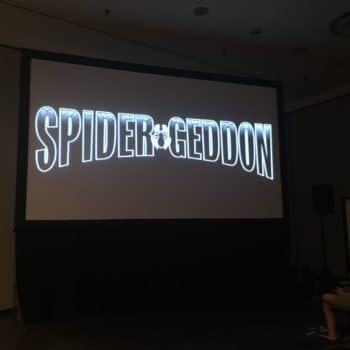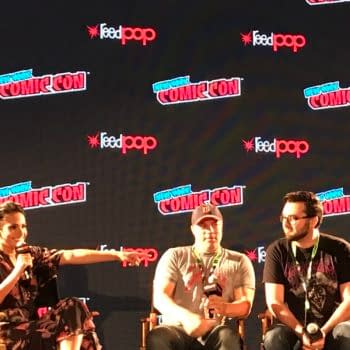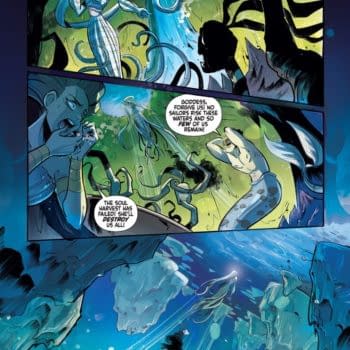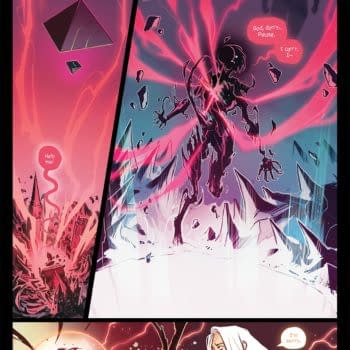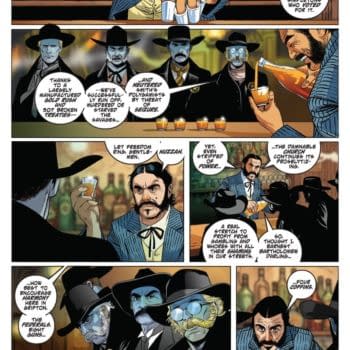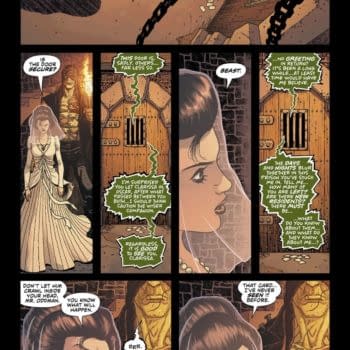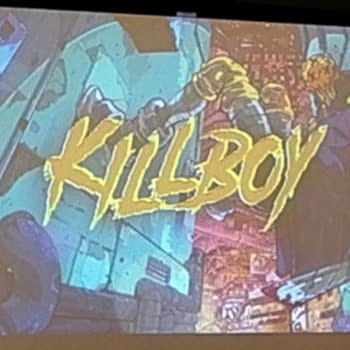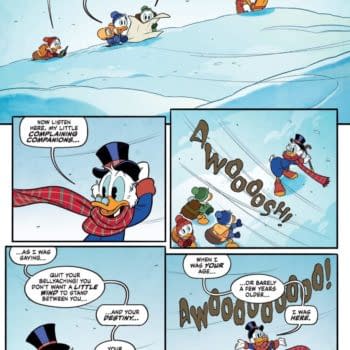Posted in: Comics | Tagged: Comics, enormous, entertainment, Tim Daniel
Talking To Tim Daniel About Enormous And The Monsters Within
By Octavio Karbank
OK: You're currently writing Enormous. Let's talk about that.
Tim Daniel: Enormous started a year and a half ago. Originally, we published a 64-page one-shot in 2012. The idea was originally conceived as something a little more sprawling. The one-shot forced us to cover a lot of ground really quickly, i.e. the ground we're now covering and going beyond with, with the ongoing series. So now with the ongoing series we're going to do this the way we conceived it. We're going to go a bit more in depth with the characters, we're going to see a little bit more of the landscape, the ecology, which means all the giant monsters; we're going to see that in depth. The plan is a sixty-issue, complete, finished piece. That's the plan for the series. I'm currently writing it. We're finishing up the second arc, the second volume, and that's the plan.
OK: In your work, the theme of monsters goes side-by-side with people struggling with their own internal demons. Can you elaborate on that?
TD: It's something that we all deal with, right? It's something we can all recognize. We're all struggling with different things in our lives. It can be anything from how we feel about ourselves, substances abuse, a relationship we've had that didn't work the way we wanted, financial issues…whatever it is. It's really just common issues we all can identify with that, bringing humanity to any story in any genre. That always appeals to me. I want to be able to look at a character, I don't care who, what, or where they are, I just want to be able to recognize in them some of the same things I see in myself, my wife, my daughter, whomever. That theme definitely works across Enormous, Curse, and even Burning Fields, where we have dual-leads who are struggling with their personal lives for different reasons. Dana, the American detective, kind of struggling with her past and her sense of what justice is, and Aban, our Iraqi detective, struggling with what he sees is a lack of justice. They both want to pursue that, but they've been stopped from being able to. They're both frustrated by that and that's where their frustration started to come from in that particular story. It's something that many of our characters, whether it's Curse, Burning Fields, or Enormous, share: that motivation to enter into a new space for that person.
OK: Why monster stories? What were your influences?
TD: Friday nights was Creature Features. I lived in the San Francisco Bay Area and it was Creature Features on Friday night and that show had something different every Friday. I would just be praying it was a Godzilla movie, but I saw a lot of horror, in and around those giant monster films. That kind of thing had an influence on me. And then things like obviously Godzilla, obviously Ultraman. Things from my youth; I combined them with things I enjoy now. Things like The Mist, Cloverfield, or even Super 8; these are films that entertain me, but at the same time I think they offer something to take away from thematically that I can identify with, and I think a lot of people do. That was the influence for all the giant monsters. All that childhood input, combined with what was starting to happen now; I just wanted to read that story and I didn't find it. I looked around in comics, especially for something like Enormous and I went, "where's the giant monster stories?" We can tell giant monster stories in comics, and we don't need $250 million to do it. I just need me and Medhi. That's where that comes from; the need, the want, to read a story like that.
OK: Enormous is global in scope, while Burning Fields and Curse are more personal and are smaller stories. How do you go about writing a smaller story in comparison to a large one?
TD: In that case, yes, I like the more intimate, personal stories. You think about some of the examples I threw out; like The Mist. It really comes down to this father and son in a small community being affected by some mysterious phenomena that is released by the mist. Regardless of scope, you always make it personal. As people are reading Volume 1 and going into Volume 2 of Enormous, they start to see that this is a very personal tale. Regardless of the size of the magnitude of the event, it's a personal tale. You're going to see things about the lead character Ellen, and we'll start to see her relationships and how they've influenced her; those with her parents, those with her former partner who may or may not be dead, these things have all had an impact on her and driven her to a place. Regardless, I've always wanted to tell intimate, very personal, stories, so that I feel like I could identify with each of the characters, no matter the setting or what happens. I can look at them and recognize them as human beings.
OK: Many of your protagonists, or likeable characters, tend to die. Why?
TD: I think you find the arc of the character and then you see the fitting conclusion to that arc. What is that evolution for the character? What is the journey and what is the end? Sometimes it does end in death, because that's a fact of life. Often though, in some cases, particularly with Enormous, all is not as it might appear to be. I don't like to spell everything out. I want the reader to make their own decisions, their own assumptions, whether it's the health of the character, the longevity of the character, the purpose of a character; I'd like people to come at it one way, maybe have a thought or an expectation and then let it change and evolve. Some live, some die. It's not premeditated, that's the weird thing. It kind of just happens and sometimes it happens and I'm kind of shocked myself. Sometimes though, with one story in particular, we both knew that character would need an end.
OK: Your protagonists in Burning Field and Enormous are women. Was that a conscious decision on your part?
TD: I think it was a conscious decision and I think it comes from the fact that I'm raising two daughters. I don't think…particularly when Mike and I collaborate, whether it's Burning Fields or Curse, I don't think there's premeditation there. In fact, the first time Mike approached the idea of Burning Fields, he sent me a quick email, and just the name Dana Atkins was in the email. So she was just there. Mike and I thought what kind of notes do we want to hit with this; there was nothing there premeditated. With Curse, Laney was in my head. When the original discussions for Curse began, Laney was already in my head, so I introduced that to Mike and Riley Rosco, who was also on the book with us, and we talked that through, so I introduced Laney there. Again, no real premeditation. Ellen is literally a combination of Ellie, my daughter, and Erin, my wife so it was just taking that name…my wife actually models for some of the shots. That was sort of the inspiration for Ellen.
OK: Your women are very strong and they don't need someone to come rescue them.
TD: I think that's because of the examples in my life. It dates back to my childhood with my mom. My mom was a single mom and she worked hard everyday. I had a lot of good examples with women that, what we would consider in comic book stories as "strong females", I just call them examples from my life. They're just people I knew. I had really good bosses during the early parts of my career. All female, oddly enough, whatever that means, and they were good examples of women who that had worked really hard in the workplace to get to a point where they were in leadership roles. So there were a lot of good examples in my life to draw from. No real mystery there.
OK: What makes Tim Daniel's writing unique?
TD: I'm never going to repeat myself, that's definitely a goal. I'm never going to do something just because it's working and just keep doing that one thing. I want to tell a story, whether it's alone or in collaboration. I don't want to just move on to the next story. I have a lot of stories I want to tell. They are very different from one another. There's a variety. Right now it may appear like there's monsters, there's werewolves, there's demons, but I think as the next couple of books come along, readers will see that there's a lot more to the tales I've been telling. Different settings, different characters, and at some point, hopefully, I will do something that's completely non-genre. That's something I'm interested in and is my Holy Grail challenge. Can I do something that has little to no genre? Can I do a romance? Can I do a drama involving human beings with very real, typical problems and concerns? That's very interesting to me. What stands out right now is a fantastic element, whether it's Iraq and the demons in Burning Fields, or a small northern town in Wisconsin with werewolves in Curse, or even gigantic monsters across the American ruins with Enormous.
OK: What are some good accompanying pieces, to either watch or read, alongside your work?
TD: With Curse, some of the ingredients that went into that, that definitely influenced me at the time, was Breaking Bad. It was a big, big influence. Because when you think about Walter White and the choices he has to make; he's dying, right? He's been diagnosed with terminal cancer. He's done. Then he finds himself in this position of dealing meth, manufacturing and dealing meth. He makes this decision that reasonable people in reasonable conditions don't make. Well, usually. Laney does the same thing. He's in a position, that's almost unwinnable in a sense. His son has terminal leukemia and he's forced to make decisions around that that reasonable people, in reasonable positions, don't make. So Breaking Bad was a huge influence. I was also very frustrated at the time by the health care system. For Burning Fields, I think the ingredients there at the time was the first season of True Detective. The dynamic that really interested me was between the Woody character and Matthew McConaughey's Rust Cohle. John Carpenter films, both for Burning Fields and Enormous, were huge influences. Frank Darabont's The Mist, definitely; I love Cloverfield, Ultraman, and Godzilla. Definitely Zero Dark Thirty as well for Burning Fields, along with John Carpenter's The Thing.
OK: What do comics represent to you?
TD: My dreams. When I was twelve I opened up Uncanny X-Men for the first time. It was back during John Byrne and Chris Claremont's run and I opened up that book. I had seen comics before, I had comic books around the house, but it was mainly the thing where if I were sick, my dad would bring one home from the bus station. When I was twelve and I saw the work of Claremont and Byrne, and something happened. A light bulb popped in my head; this is what I want to do, this is what I want to read, this is what I love. It was instantaneous. It was weird. It was a weird effect. So for me, they represent dreams. I think the content, for a lot of people, represents and the means the same thing: lots of dreams, hopes, and aspirations. They can take us to places, in the same vain movies and novels do. They can put us in situations as readers, entertain us, but also really illuminate things for us, especially illuminating the human condition, because of the combination of the words and pictures, maybe in ways that other mediums don't. For me, they definitely represent dreams.
OK: Are you happy with the attention Enormous has received?
TD: Very happy!
OK: Are you surprised at all?
TD: Yes! To have the original one-shot debut in 2012 in San Diego and literally have someone walk off the floor to me, as I was standing at the table and say, "I want this book. I want to option this book as a television series or a film." You asked me what comics symbolize to me, talk about a dream thing happening, that's kind of amazing. So to have a producer just come up and offer that…that could be potentially life changing; so yeah, I'm surprised. Yeah, I'm really grateful. More importantly, I'm surprised by the fact that it's gained this momentum. People are just discovering it. They weren't told this was something they had to discover; they weren't pre-sold the book. I'm nobody in terms of my stature in the industry, compared to others who have spent decades building that reputation. So for people to take that risk and buy it, and read it and actually enjoy it, I find it very surprising.
OK: What is your favorite comic, or favorite issue(s) of a comic that you've written?
TD: Favorite issues…I'm going to say this: I enjoy them all. I really do. I feel really lucky that I get to do this, but Enormous number one. To me, after having the one-shot and then having the two-year break, the fact that we did it, the fact that we pulled it off and the fact that it was 48-pages, which is essentially the same as a 64-page one-shot more or less. I was really proud of that. It took a lot of determination to continue, when it didn't feel like we would. So Enormous 1 for sure, Burning Fields #4 and #5 maybe, because there's this mixture of the very personal and some grisly action and I like that. Curse #4, which is the conclusion, because it is so personal to me. Every time I read it, and I do read my own work because I like to cringe, but I like to learn from myself, and reading that issue always gives me the chills due to how personal it is to me.
OK: What was your path like, leading into comics?
TD: It was convoluted and it began in 2003. I started doing web design for a couple of different creators. From there, I started doing logo design, and then I started doing pull book design, cover-to-cover, whatever needed to be done. Brought back the spine, interior pages; doing all that, I started to write, writing Enormous actually, and just working and learning how to write a pitch. That's important. It was about four to five years of doing different design work, before I pitched Jim Valentino at Shadowline with Enormous and he took it and helped me develop it. That was my way in. It was a long one and it was circuitous, but I think if you want in to something, you'll do whatever it takes to get you there into that position, where you give yourself an opportunity to do it.
OK: Final question, and I always ask this: What does the art of writing/storytelling mean to you?
TD: Oh, wow! In that sense, I think it's the most creatively rewarding thing I've ever done. It is an amazing experience to write something that's just words, that are just letters on a piece of paper, and then see these talented people just bring that back. These artists, like Mehdi Cheggour, like Colin Lorimer and Riley Rossmo; some of the newer artists that I'm working with, Michael Kennedy and Ricardo Drumond, and to see what they do with it? That to me is an amazing experience. I love my inbox. Particularly on days where all this art starts coming back to me and I see my little vision fully realized. I think it's the most creatively rewarding thing I've ever done.
OK: Wonderful. Thank you!
TD: Thank you!
–
Octavio Karbank is a writer and bona fide Whovian. Living in Massachusetts, you can find him on Twitter @TymeHunter and his blog www.cozmicventures.com




